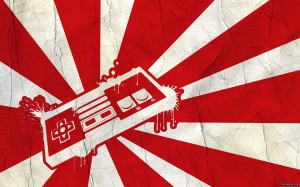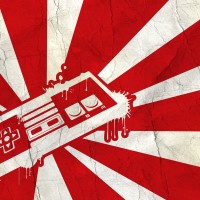 I have always enjoyed grand epic storytelling; novels, classic literature, comics, film, video games, but not really television until recently. Television when I was growing up didn’t have much in the way of story line progression. Shows had good guys and bad guys and they would duke it out for thirty minutes until the good guys won, that was about it. When I think of the Teenage Mutant Ninja Turtles I can’t think of a epic progression for the Turtles towards building a safer city. Batman had to stop the Joker again and again without any actual resolution. Brain and Pinky were always foiled and had to try again, without much success. It wasn’t important to play reruns in any kind of episodic or even seasonal order. Plus reruns were valuable, possibly the only way to get your superhero fix before Saturday, and maybe even one I hadn’t seen before. Every episode of every show I watched was interchangeable. That changed for me when I started watching anime.
I have always enjoyed grand epic storytelling; novels, classic literature, comics, film, video games, but not really television until recently. Television when I was growing up didn’t have much in the way of story line progression. Shows had good guys and bad guys and they would duke it out for thirty minutes until the good guys won, that was about it. When I think of the Teenage Mutant Ninja Turtles I can’t think of a epic progression for the Turtles towards building a safer city. Batman had to stop the Joker again and again without any actual resolution. Brain and Pinky were always foiled and had to try again, without much success. It wasn’t important to play reruns in any kind of episodic or even seasonal order. Plus reruns were valuable, possibly the only way to get your superhero fix before Saturday, and maybe even one I hadn’t seen before. Every episode of every show I watched was interchangeable. That changed for me when I started watching anime.
Back in the early 90’s, in the United States at least, anime was hard to come by. My older brother and I would go to the select few comic shops that could order the titles we were looking for from catalogs or had overseas contacts, there were no internet sales for years to come. I would have to wait for months to get the next VHS installment of whatever cut rate subtitle job someone had recorded of Japanese television for fan-boy consumption abroad. It just seemed to me that Japanese cartoons had a different and more entertaining perspective on storytelling. In the U.S. if Spiderman could walk on walls and sense danger we wanted to know how and why, but we didn’t much care if he ever learned to grow up and talk to girls. In Japan if a hero could shoot laser blasts and cut bullets out of the air it needed no more explanation than he was a badass, but over time you could be sure to learn the secrets of his past, the importance of the quest, and eventually a resolution.
That’s all changed now of course. Anime is everywhere, and U.S. shows are often epic stories with character transformation and plot discovery. Think about how important each episode is in understanding a bigger picture in Lost, versus the X-Files. And it continues to shift. Nothing like Netflix’s new series House of Cards existed just a few years ago. Forbes contributor Steven Rosenbaum recently wrote about the serious backlash from readers he got when he suggested that releasing the whole series in one lump to streaming devices was a dumb move. He goes on to quote Ted Sarandos the Chief Content Officer at Netflix, “we’re trying to evolve television, we’re crafting long-form storytelling, to be watched any way you want to watch it.” (read the whole article here)
The same thing is starting to happen in gaming. In her interview with Engadget, CEO of Ouya Julie Uhrman mentioned “episodic gaming” and subscription based gaming on a console as being in the near future for video games. (watch the interview here) The on demand model for entertainment will give rise to a whole new genera of video games probably by the end of the year, and we can expect that the popular epic storytelling games of tomorrow will be more like How Mario Met Your Mother, than Final Fantasy.

Links